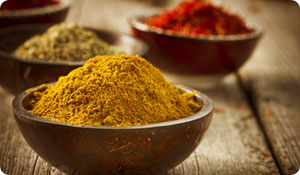
A simple household spice may have the power to protect your heart.
Turmeric, a spice from Southeast Asia, has long been touted as having antioxidant and anti-inflammatory properties. Traditional Chinese medicine and Ayurvedic medicine (which originated in India) have used turmeric extracts for centuries to treat a variety of illnesses. Modern medical researchers have been looking for proof of turmeric's health benefits, and over the past two decades, evidence has been mounting that it may help your heart. More studies need to be performed to better understand the link, but if turmeric continues to show promise, you may want to update your spice rack.
Curry and Cardio Health: What's the Connection?
If you're familiar with turmeric, it's probably because you know it as the main spice in curry. It's also used to make mustards, butters, and cheeses. Health experts tend to focus on the active ingredient in turmeric: curcumin. Curcumin seems to counter inflammation, which is believed to play a major role in most cardiovascular diseases. Specifically, inflammation has been found to contribute to atherosclerosis, abdominal aortic aneurysm, and increased levels of C-reactive protein (which may put you at greater risk for heart disease). Some studies have shown that a diet high in curcumin may lower your chances of developing these cardiovascular diseases.
Many of the findings supporting a link between turmeric and heart health are based on animal studies. However, a study published in 2012 followed human patients who were undergoing heart bypass surgery. A group of the patients received a curcumin supplement beginning three days before surgery and continuing for several days post-op. The curcumin group showed significantly lower levels of inflammation and were 65 percent less likely to have a heart attack after the surgery than the non-curcumin group.
How to Reap the Turmeric Benefits
The studies that have been conducted so far usually include very high doses of curcumin. For instance, in the study of bypass patients, 1 gram of curcumin was administered four times a day. You're not going to get that dose of curcumin eating curry a few times a week. If you're interested in increasing your turmeric or curcumin intake, consider talking to your primary care physician about taking a daily curcumin supplement. You can also begin to incorporate turmeric into your regular diet. In fact, the spice can be used to replace some of the salt in recipes, offering you a way to get more of a health boost while decreasing your intake of sodium.
Weighing the Benefits and Drawbacks
Overall, curcumin might offer good protection against cardiovascular disease and may provide anti-inflammatory protection without the possible risks that accompany medications such as nonsteroidal anti-inflammatory drugs (NSAIDs). Yet, while turmeric is generally considered safe, it can cause nausea or diarrhea in high doses. It's also not recommended for pregnant or breastfeeding women or those with gallbladder problems, and it may slow blood clotting. So before you begin taking turmeric or curcumin supplements, talk to your health care provider to ensure it's a good option for you.
Sources:
Aggarwal, Bharat B. and Harikumar, Kuzhuvelil B. "Potential Therapeutic Effects of Curcumin, the Anti-inflammatory Agent, Against Neurodegenerative, Cardiovascular, Pulmonary, Metabolic, Autoimmune and Neoplastic Diseases." The International Journal of Biochemistry & Cell Biology. 41.1: 40-59 (2009). Web July 12, 2012
http://www.ncbi.nlm.nih.gov/pmc/articles/PMC2637808/
"Turmeric." MedLine Plus. October 21, 2011. Web, July 12, 2012
http://www.nlm.nih.gov/medlineplus/druginfo/natural/662.html
"Turmeric May Help Reduce Future Heart Attacks After By Pass Surgery." Iowa Health. June 1, 2012. Web. July 12, 2012
http://www.iowahealth.org/heart-health-news.aspx?id=779&Turmeric+May+Help+Reduce+Future+Heart+Attacks+After+By+Pass+Surgery





